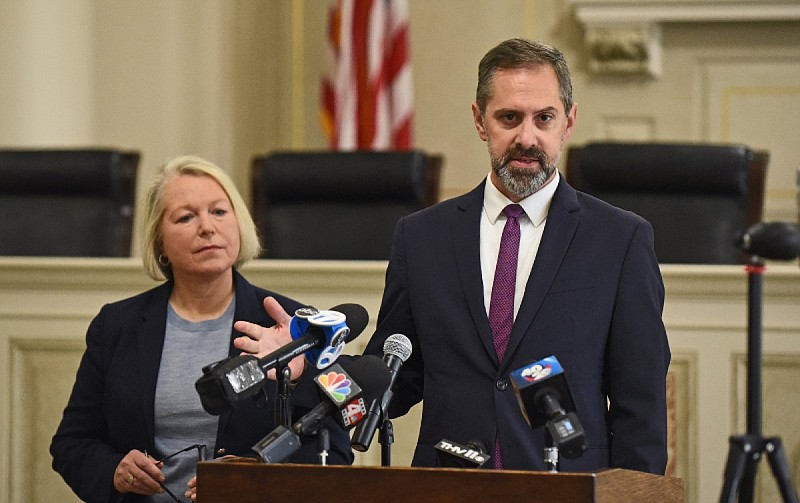A bill aimed at increasing wages for school staff by $4 an hour failed to pass the Senate Education Committee on Wednesday.
The committee in a voice vote tabled Senate Bill 149, with Republican members saying they would prefer to wait for Gov. Sarah Huckabee Sanders to file her long-anticipated education bill before deciding on raises.
The bill, sponsored by Sen. Greg Leding, D-Fayetteville, would "advise all public school districts" to pay classified staff at least $15 an hour. Classified staff includes custodians, bus drivers, nurses and special education paraprofessionals.
"I think they voted to table it to keep them from having to vote 'no,' which I understand and was not surprising," Leding said.
Leding's bill is aimed at increasing wages for workers, whom schools have had trouble retaining, by increasing foundation funding, the amount of state funds schools receive. The bill would increase the foundation funding from $7,413 for the 2022-2023 school year to $8,195 for the 2023-2024 school year, and then to $8,370 for the 2025-2026 school year.
However, school districts have wide discretion in how they spend state funds and would not be required to use the additional dollars to pay employees more. Instead, the Department of Education would issue a commissioners memo to school districts asking them to use the extra funding to pay their employees more, Leding said.
"There is nothing in this that requires districts to actually pay $15 an hour," said Sen. Jim Dotson, R-Bentonville. "I mean, it's a great headline and all I know, but it's not going to be felt by the actual employees of districts if this passes."
The bill would require the Department of Education to "advise all public school districts" to adopt a $15-per-hour minimum wage, then tie minimum wages for classified school staff to the growth percentage of the Consumer Price Index.
"You're right, sometimes funding is directed elsewhere, but I think it's our job to at least make sure they have the funding to make this possible," Leding said. "Because if we don't give them the funding to give pay raises, they won't be able to give the pay raises."
Prior to the session, the House Education Committee proposed a $2-per-hour increase for classified workers as part of its funding formula for the 2023-2024 school year. Leding said he wanted to double the increase to up the minimum wage to $15 an hour for school staff to help retain workers.
Sen. Breanne Davis, R-Russellville, said Sanders' education bill will include an increase in foundation funding, but did not say whether the plan will specifically call for wage increases for classified staff.
"I think it's important that we wait and deal with this, as we already intend to in the education bill, and we'll see those foundation funding increases at that time," Davis said.
Last week, Sanders released some details of her education proposal, which includes a $14,000 increase in the minimum starting salary for teachers. The minimum salary for teachers is set at $36,000 in Arkansas law. Sanders said her education bill, which has not been publicly released, will increase the minimum starting salary for teachers to $50,000.
The week before the governor announced details of her education plan, Democrats filed a bill to raise the minimum teacher salary to $50,000.
Leding, a co-sponsor of the Democrats' teacher pay raise bill, said he hoped his bill calling for pay raises for school staff would move Sanders to adopt salary increases for staff in her education bill as well.
Like with teachers, schools are having trouble retaining classified staff as nationwide labor shortages have led to school workers seeking better pay elsewhere. Kisha Dunn, a custodian at Jefferson Elementary in Little Rock, told the committee she works multiple jobs to help keep up with the rising costs of food and rent.
"Even just a little bit could help us out so we can stay," Dunn said. "Because a lot of us like working for the district, like working for the schools, so why push the good people away?"
